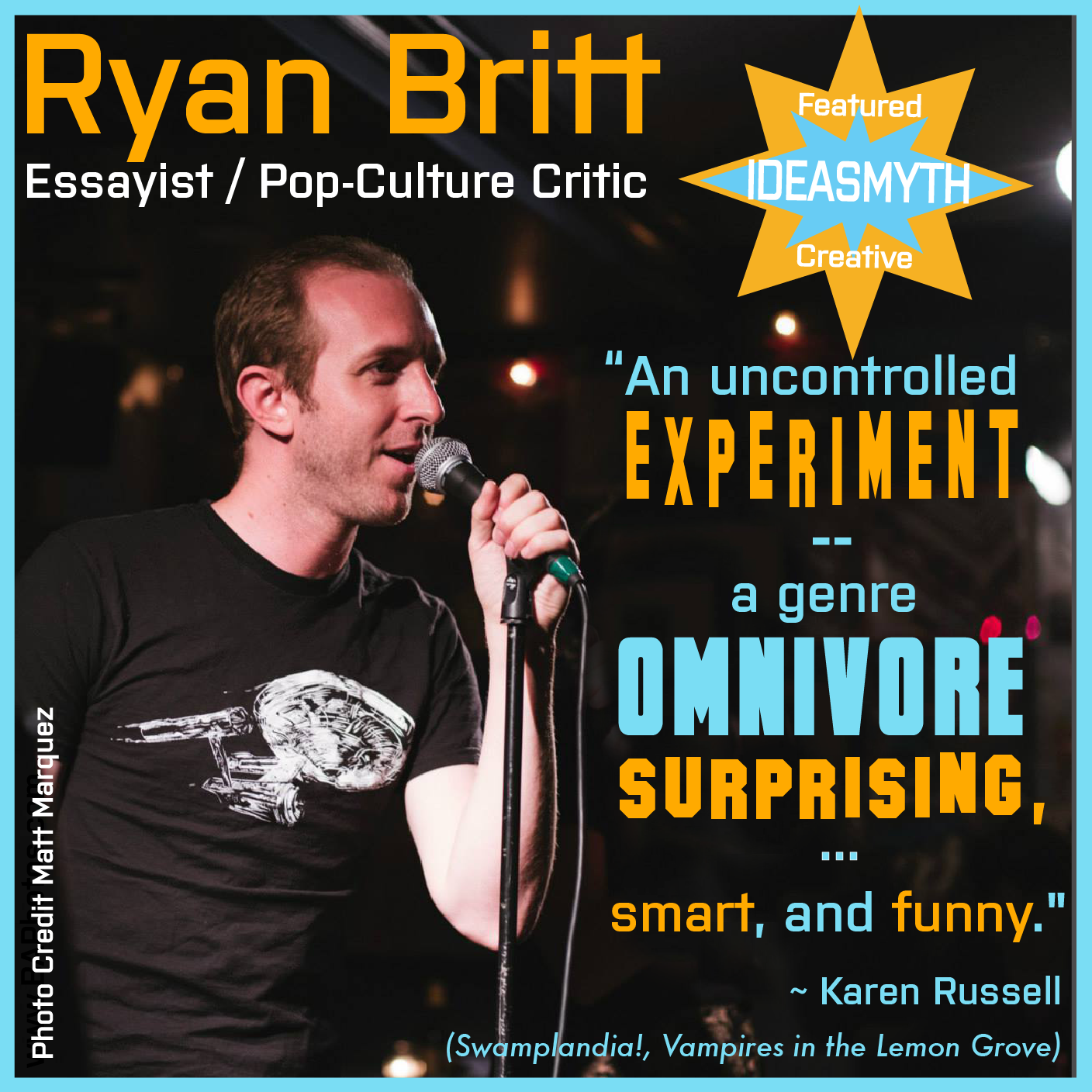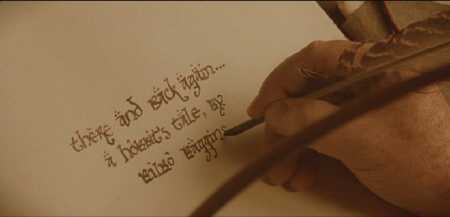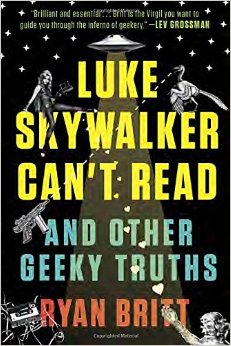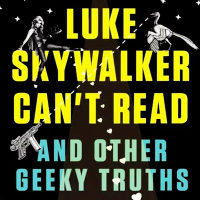 Ryan Britt is the Halley’s comet of pop culture critics: a rare bright light not to be missed! His sci-fi criticism embraces a Sedaris-like sense of the absurd that has landed his byline in publications from The New York Times to VICE—and gotten him a book deal (Luke Skywalker Can’t Read: And Other Geeky Truths)—especially impressive for a book industry that typically thumbs its nose to essay collections. This week, he shares some of the geographic and emotional journeys and odd jobs (including “waitress” and “cat-sitter”) that happened along the way to identifying himself as a “Pop-Culture Sci-Fi Guru” (as the back of his book will tell you). We wish we had our own personal TARDIS time machine so we could re-live first encountering his writing multiple times.
Ryan Britt is the Halley’s comet of pop culture critics: a rare bright light not to be missed! His sci-fi criticism embraces a Sedaris-like sense of the absurd that has landed his byline in publications from The New York Times to VICE—and gotten him a book deal (Luke Skywalker Can’t Read: And Other Geeky Truths)—especially impressive for a book industry that typically thumbs its nose to essay collections. This week, he shares some of the geographic and emotional journeys and odd jobs (including “waitress” and “cat-sitter”) that happened along the way to identifying himself as a “Pop-Culture Sci-Fi Guru” (as the back of his book will tell you). We wish we had our own personal TARDIS time machine so we could re-live first encountering his writing multiple times.
~The Ideasmyth Team
***

Bilbo writing his famous life story; Source: theonering.net
The most famous fantasy novel–The Hobbit–also contains inside of it a pseudo-memoir. Bilbo Baggins claims to be writing his life story; a chronicle of all of his adventures called “There And Back Again.” But the thing about writing about your “real life” directly is that in many ways, at least emotionally, there is no going back.
Writing creative non-fiction isn’t just tricky, it’s also vastly draining because in some ways, there’s a temptation for everything that’s ever happened to you to take on an “extra” amount of significance. Interesting events in your life are, well interesting to put into essays, books, or live stories, but not all of these journeys are created equal. Bilbo probably recognized that chilling with a dragon and a little critter named Gollum were memorable moments, and as such, included them in his writing. But not all encounters with one’s real life dragons or Gollums should go in your writing.
The only problem is, when you’re first starting out, you don’t exactly know that.
Part of the process of becoming better at your writing is to make a lot of mistakes, and sometimes you only recognize those things were mistakes years later. I’m not saying I regret anything I’ve published exactly, but there are certain things I would write differently now. It’s hard to deal with some of these consequences inside of your mind, because every once in a while someone will say, “Hey, that thing you put in your essay, actually kind of hurt my feelings.”

The Hunger Games‘ Katniss Everdeen; Source: mirror.co.uk
Bilbo is able to come back to his old life at the end of The Hobbit, but once you start writing creative non-fiction, that’s just not possible. You’re on that journey forever. Whatever emotional version you had of “home” existed for you prior to becoming someone who wrote about their life, is gone. It’s like in The Hunger Games when someone casually tells Katniss that District 12 was burned down. That’s your old life! You’re never going to get it back. There’s no clicking your heels and ending up back in Kansas, you’re a writer now and it’s going to get tough.

Britt’s book, now available for purchase here
By “tough” what do I mean? Well, it’s not like all your friends are going to worry about showing up in your writing, but it will happen from time to time, because–duh–you’re going to put them in your writing from time to time! It’s just that you have to find a way of accepting that. Being a writer (or storyteller) of non-fiction is all about accepting your life as is and guess what: your art is part of your life! It’s not something that’s separate! You’ve gone on the journey and now you have to stay there.
Practically, what this means is figuring out how not to have regrets but simultaneously recognizing when you’ve been in the wrong. At the risk of getting super self-helpy; I’m probably wrong more than I’m right and I really have to be okay with that. If you starting writing and performing publicly, you’re increasing the chances of someone calling you out on being wrong by like 1000% percent. People call this “bravery” sometimes, but mostly it’s just insane. You might think early parts of a writer’s career are hard because there’s so much rejection, but when that rejection goes away, there’s also a fair amount of criticism.
The only way to deal with this is to embrace your flaws–both as a writer and as a person. If you’re lucky, some of that honesty will make it’s way into your work. And hopefully, the world will be better for all that you’re sharing.
 ~~~Ryan Britt’s writing has appeared in The New York Times, VICE, The Awl, The Morning News, Nerve, Omni, Clarkesworld, The MindHut, The Barnes and Noble Book Blog, Electric Literature, Crossed Genres, The Drum, The Literary Hub and elsewhere. He was formerly the staff writer at the Hugo-Award Winning Web Magazine Tor.com, where he remains a contributor.
~~~Ryan Britt’s writing has appeared in The New York Times, VICE, The Awl, The Morning News, Nerve, Omni, Clarkesworld, The MindHut, The Barnes and Noble Book Blog, Electric Literature, Crossed Genres, The Drum, The Literary Hub and elsewhere. He was formerly the staff writer at the Hugo-Award Winning Web Magazine Tor.com, where he remains a contributor.
Ryan has told stories on stage with The Moth, The Liar Show, RISK! and is the co-curator of two live reading series; Lust for Genre and The Hi-Fi Reading Series. He currently teaches writing for Media Bistro, The Sackett Street Writers’ Workshop, Catapult as well as privately.
Ryan’s first book, the essay collection Luke Skywalker Can’t Read and Other Geeky Truths, will be published by Plume (an imprint of Penguin Random House) on November 24th, 2015.

